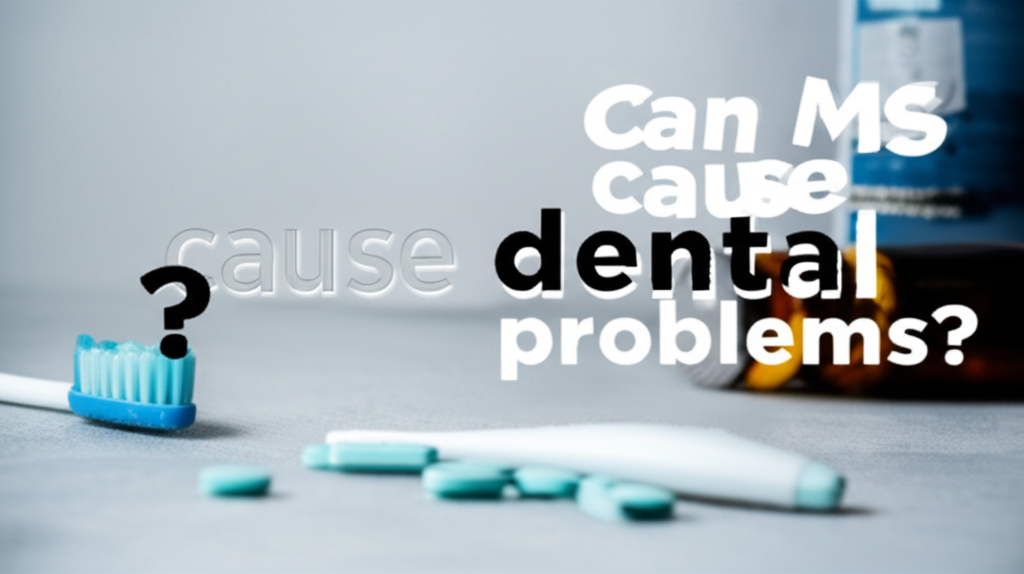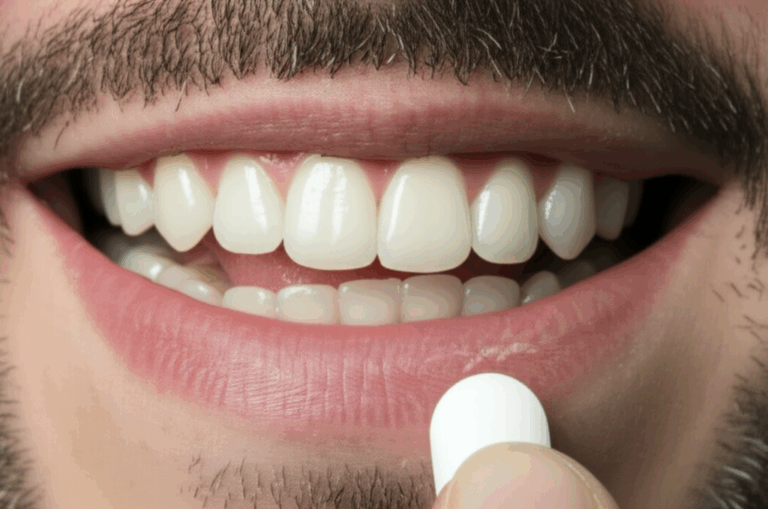
Can MS Cause Dental Problems? Understanding the Link and Taking Charge of Your Oral Health
Do you live with Multiple Sclerosis (MS), or help someone who does, and wonder why dry mouth, gum problems, or tooth pain suddenly show up? Maybe dental visits are tougher these days, or jaw and nerve pain have you asking, “Could this all be because of my MS?” If so, you’re not alone—and your question is totally fair.
Having MS means coping with many different symptoms. Your brain, body, and daily life all feel the effects. But here’s something that doesn’t get talked about enough: MS really can change your oral health, sometimes in ways you might not notice at first. It’s not just the disease itself, either—as you’ll see, your meds, your habits, and even your mood can affect your mouth.
You deserve straightforward answers and easy steps to help take care of your mouth. Let’s break down the science, answer common questions, and most importantly—help you feel better about your smile, your comfort, and your overall health.
Table of Contents
- Can MS Actually Cause Dental Problems? The Short Answer
- The Science: How Does Multiple Sclerosis Affect Oral Health?
- Common Dental Problems for People with MS (And Why They Happen)
- Proactive Tips: Caring for Your Mouth When You Have MS
- Real Statistics: How Common Are These Problems?
- When to Call the Dentist (Warning Signs)
- Key Takeaways: What to Do Next for a Healthy Mouth—and Life—with MS
- Frequently Asked Questions About MS and Dental Health
- More Resources and Support
- A Final Word: Your Smile, Your Health, Your Power
Can MS Actually Cause Dental Problems? The Short Answer
Here’s the simple truth: Yes, MS can cause or make you more likely to get all kinds of dental and mouth problems—and this often happens in a few ways at the same time.
You might have dry mouth, gum problems, tooth decay, mouth infections, or nerve pain not just because of MS itself, but from your meds, changes in how you care for your mouth, or even changes in what you eat or how you feel. You don’t have to “just deal with it.”
It’s totally normal to have questions or worries (like, “Why do my teeth hurt all of a sudden?”), but knowing what’s going on and being ready makes a big difference. Let’s talk about why these problems happen, what’s happening in your mouth when you have MS, and what you can do to protect your smile.
The Science: How Does Multiple Sclerosis Affect Oral Health?
You probably know MS is more than a “nerve disease”—it’s when the body’s immune system attacks the covering (myelin) on nerves, messing up signals everywhere. But what does that mean for your mouth?
A. Medication Side Effects
Think about it: you’re taking medicines to help MS symptoms. But these same pills can sometimes leave your mouth dry, or make it easier to get an infection. Here’s how:
- Dry Mouth (Xerostomia):
Many MS medicines—including ones for stiff muscles, depression, or spasms—make your mouth less wet. Saliva is your mouth’s helper, washing away food, fighting germs, and making things feel slick and comfortable. Without it, you get more cavities, gum problems, trouble swallowing, and painful mouth sores.
- Steroids:
Medicines like prednisone can lower your immunity, making oral thrush (a mouth yeast infection) more likely. Over time, they can also hurt your jawbone.
- Immune-Suppressing Drugs:
Some MS meds help control the disease but also make your mouth more open to infections—cold sores, mouth fungus, or sores that don’t heal fast.
#### Example:
Think of your mouth as a garden. If there’s no water (saliva), weeds (bacteria and fungus) grow fast. Medicines are important, but they also change your “garden.”
B. MS Symptoms and Their Impact Inside Your Mouth
Even when you use your medicines the right way, MS itself can make caring for your teeth harder.
- Tiredness:
Brushing and flossing can feel like a HUGE effort when you’re worn out. It’s easy to skip your routine.
- Trouble With Hand Movements:
If your hands are shaky or weak, holding a toothbrush or flossing is harder. It’s tempting to just not do it.
- Tight Jaw Muscles:
Stiff jaw muscles can make you clench or grind your teeth (bruxism), feel pain in your jaw joints (TMJ), or struggle to open your mouth wide at the dentist.
- Trigeminal Neuralgia:
This is terrible, lightning-like face or tooth pain that comes and goes. People with MS are MUCH more likely to get it than others.
- Trouble Swallowing:
If swallowing is tough, food stays in your mouth longer, which can lead to decay or infection. You might also eat softer (and sometimes sweeter) foods for comfort.
- Numbness or Weakness in Your Face:
It’s easy to miss a new chip, sore, or cavity if you can’t feel part of your mouth.
- Forgetfulness or “Brain Fog”:
“Did I brush already today?” MS can make it tough to follow your routine or remember dental appointments.
C. Other Things That Add to the Risk
- Changes in Your Diet:
If chewing is hard, you may eat more sticky or sweet foods instead of crunchy, healthy ones. This isn’t great for your teeth.
- How You Feel Mentally:
Feeling down or worried (which happens a lot with MS) can make it harder to brush, floss, or see the dentist regularly.
Common Dental Problems for People with MS (And Why They Happen)
Now that we’ve talked about the “why,” let’s list the problems most often found in people with MS. If you see yourself here, you’re not alone.
1. Dry Mouth (Xerostomia)
- Feels like your mouth is always dry, especially at night.
- Makes cavities, gum problems, and infections more likely.
2. Cavities
- Tooth decay happens easier when there’s not much saliva and it’s hard to brush or floss.
- Diets high in sugar (even soft foods) add to this.
3. Gum Disease
- Gums get inflamed, red, or bleed when brushing.
- Can turn into bigger problems (periodontitis) that can even hurt your jawbone.
4. Mouth Infections
- Thrush (white, creamy fungal infection) is common, especially if you use steroid inhalers or have low immunity.
- Cold sores and mouth ulcers that won’t heal can also happen more often.
5. Jaw Joint Problems and Teeth Grinding (TMJ & Bruxism)
- Jaw hurts, pops, or feels tired. Grinding or clenching your teeth can happen, especially when you’re tired, stressed, or have tight muscles.
6. Trigeminal Neuralgia
- Sudden, strong shooting pain in your face or teeth that comes and goes for no reason.
- Can sometimes get mistaken for normal tooth pain and treated the wrong way.
7. Problems With Dental Devices
- Dentures, bridges, or retainers might be uncomfortable if you have weak muscles, spasticity, or dry mouth.
#### Why Are These So Common?
Remember the “garden”: less saliva is like a dry garden (easy for weeds); shaky hands make cleaning harder; stress or low mood means you might not “garden” as often; and sometimes, you can’t even feel when something starts to go wrong.
Proactive Tips: Caring for Your Mouth When You Have MS
You don’t have to let these problems take over your mouth or your smile. With some smart tricks, you can lower your risk and make dental care easier—no matter how your MS is acting up.
At-Home Mouth Care Tricks
1. Fight Dry Mouth:
- Sip water often—even if you don’t feel thirsty.
- Use fake saliva, special sprays, or mouth gels to keep things wet.
- Chew sugar-free gum or use sugar-free candies to get saliva going.
- Use toothpaste with fluoride, and ask your dentist about prescription fluoride mouth rinse.
2. Use Easy Tools:
- Electric toothbrushes do most of the work for you—great if holding things is hard.
- Floss holders or tiny brushes (“interdental” brushes) are easier than regular floss for many people.
- Big, squishy grips can go on toothbrush handles to make them easier to hold.
3. Keep Your Routine Simple:
- Brush in the morning and night, and floss once a day—even if you have to take a break halfway.
- Put reminders on your phone, or keep a chart in the bathroom to keep track.
4. Pick the Right Foods:
- Stay away from a lot of sugar and sour drinks (like soda or orange juice) that can wear down your teeth.
- Try to eat a good mix of leafy veggies, lean meat, and crunchy fruits/veggies (if you can chew them).
- If swallowing is hard, ask your doctor or speech therapist for foods that are safe and aren’t full of sugar.
Working With Your Dental Team
- Go for regular cleanings and checkups—try for every 3–6 months if possible.
- Be open: tell your dentist and hygienist about your MS, your meds, and what’s hard for you. The more they know, the more they can help!
- Ask for more time, breaks, or things like ramps or chairs that move up and down for comfort.
- Ask about ways to make the visit easier (like medicine to help you relax, special fluoride, or rinse to fight germs).
Getting Help From Others
- Make sure your doctor, dentist, and therapists (speech, occupational) are all on the same page. Teamwork helps a lot.
- Friends and family can help you remember to brush, set up your stuff, and go with you to the dentist if you need help.
- Check out MS or dental groups (online or in person) for good advice and support.
Real Statistics: How Common Are These Problems?
You’re not making it up—look at these real numbers:
| Dental Problem or Risk | How Common It Is in People With MS | More Info |
|---|---|---|
| Dry Mouth | 40–70% | Often from meds or MS effects |
| Cavities | 20–30% more than people without MS | Because of less spit and brushing problems |
| Gum Disease | 70–90% (gingivitis), 30–50% (bone loss) | Because it’s tough to keep teeth clean |
| Trigeminal Neuralgia | 2–6% (100x more than others) | Usually not regular tooth pain |
| Trouble With Brushing/Flossing | More than 50% | Because of shaking or being too tired |
| Jaw Problems/Grinding | 25–40% | Stiff muscles or stress |
| Mouth Infections | 10–20% more than other people | Especially with weak immunity or dry mouth |
| Trouble Getting Dental Care | 60–75% | Buildings, stress, and getting there is hard |
Sources: Trusted dental and medical groups and MS research
When to Call the Dentist (Warning Signs)
Don’t wait for things to “just go away.” If you notice any of these, talk to your dentist soon:
- Ongoing mouth pain, especially if it’s sharp or stabbing (even if you don’t know if it’s your teeth or nerves)
- Bleeding, puffy, or sore gums
- White patches, sores, or wounds in your mouth that won’t heal
- Bad breath or a weird taste that just won’t leave
- New trouble biting, swallowing, or talking
- Your dentures, bridges, or other dental stuff feels wrong all of a sudden
- Suddenly sensitive teeth (cold, hot, or sweet things hurt)
Your dentist would rather help you early than have to fix a big problem later. Don’t wait—get checked out!
Key Takeaways: What to Do Next for a Healthy Mouth—and Life—with MS
Let’s wrap it up with the most important points—and a simple plan for a healthier, more comfortable mouth.
Here’s What to Remember:
- MS can affect your mouth. It does this because of medicines, symptoms themselves, and changes in what you do or feel.
- Dry mouth and gum problems are super common. The risk of tooth decay, nerve pain, and jaw issues is also higher.
- You still have control. Easy-to-use tools, home tricks, and a caring dental team make it much easier.
- Tell your dental team about your MS and what’s tough for you. Don’t be afraid to ask for changes or special help.
- Act early. See a dentist for new problems and keep up with checkups. It’s easier to stop problems than to fix big ones later.
What Can You Do Right Now?
- Tell your dentist and hygienist about your MS, symptoms, and your meds.
- Make a mouth care routine that works for you—use gadgets or ask for help if you need it.
- Try to cut down on sugar or acidic drinks and make plain water your main drink.
- Speak up for what you need at the dentist’s office.
- Keep track of any new changes in your mouth, and tell the whole care team.
- Don’t give up on your smile—it’s worth it!
Frequently Asked Questions About MS and Dental Health
Q: Will treating my MS fix my dental problems?
A: Treating your MS helps, especially if you’re less tired or can use your hands better. But you’ll usually need some extra tips, like fighting dry mouth, better cleaning, and handling nerve pain.
Q: Are there dentists who know how to help people with MS or trouble moving?
A: More and more are paying attention! Look for “special care dentistry,” or clinics that handle people with nerve or long-term health problems.
Q: Is it safe to get fillings, crowns, or implants if I have MS?
A: Most of the time, dental work is safe—even with ceramics or zirconia. Just make sure your dentist and doctor know all your meds and how you’re doing. Some things might need special care, so ask your dentist and your doctor first for big procedures.
Want info on safe dental materials or dentures? You can check out this implant dental laboratory for simple ideas on safe and modern options if you have health problems.
More Resources and Support
- For a closer look at how mouth health connects to your whole body, check out this teeth health guide.
- Curious about new, gentle dental repairs with ceramics or zirconia? See the latest from this dental ceramics lab.
- Need pictures or models to help understand your choices? Modern 3d dental labs can help make dental devices for all kinds of needs.
A Final Word: Your Smile, Your Health, Your Power
Living with MS can be full of surprises. But your mouth shouldn’t be another puzzle or thing to fear. With some simple habits, a dentist who “gets it,” and knowing how to ask for help, you can handle these mouth problems—and even feel great.
You’re not just a patient—you’re the boss of your care team. Whether you’re taking on dry mouth, changing how you brush, or telling someone about jaw pain, every single step you take is a win. Take care of your smile, and you’ll help your whole self.
If this guide gave you new ideas or made you feel ready to take action—share it with others going through MS. Here’s to brighter, happier smiles for all!
Sources: American Dental Association, National Multiple Sclerosis Society, dental and medical journals. This article is for learning only—it’s not a replacement for the advice of your own doctor or dentist.








